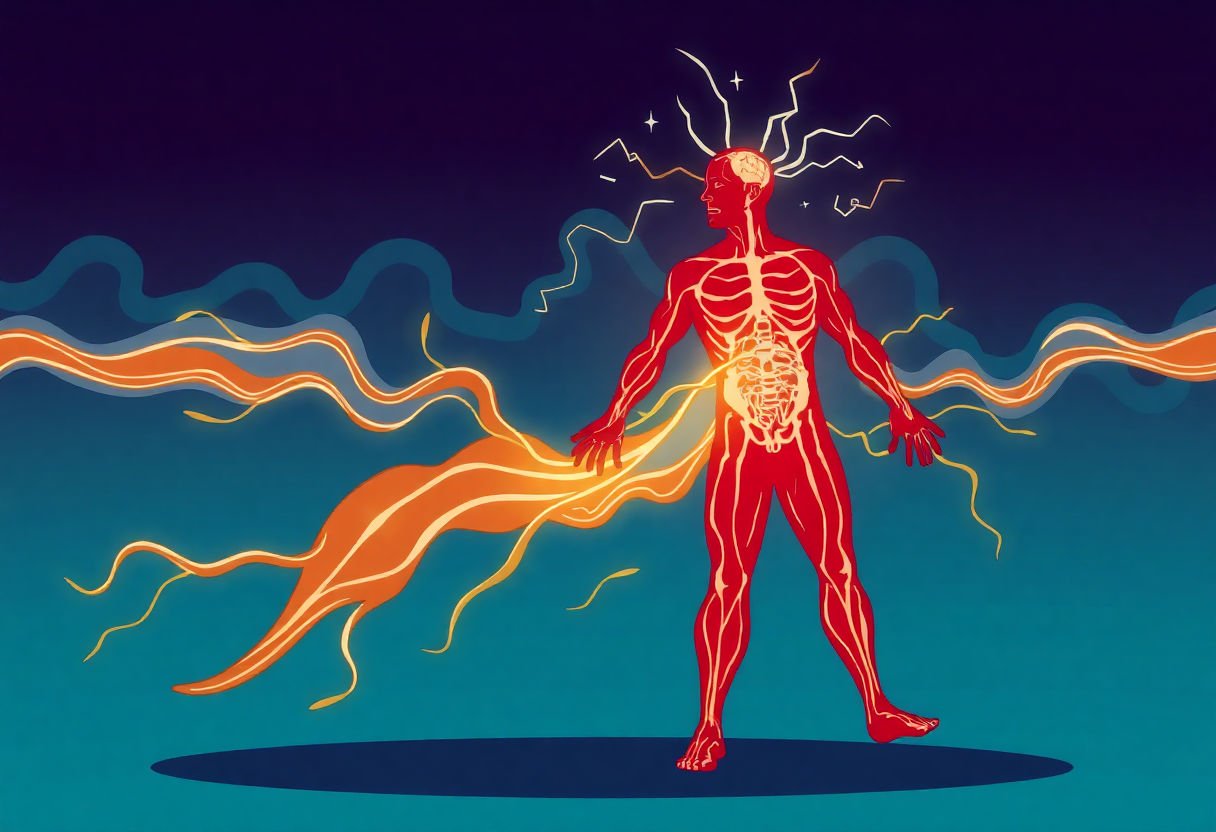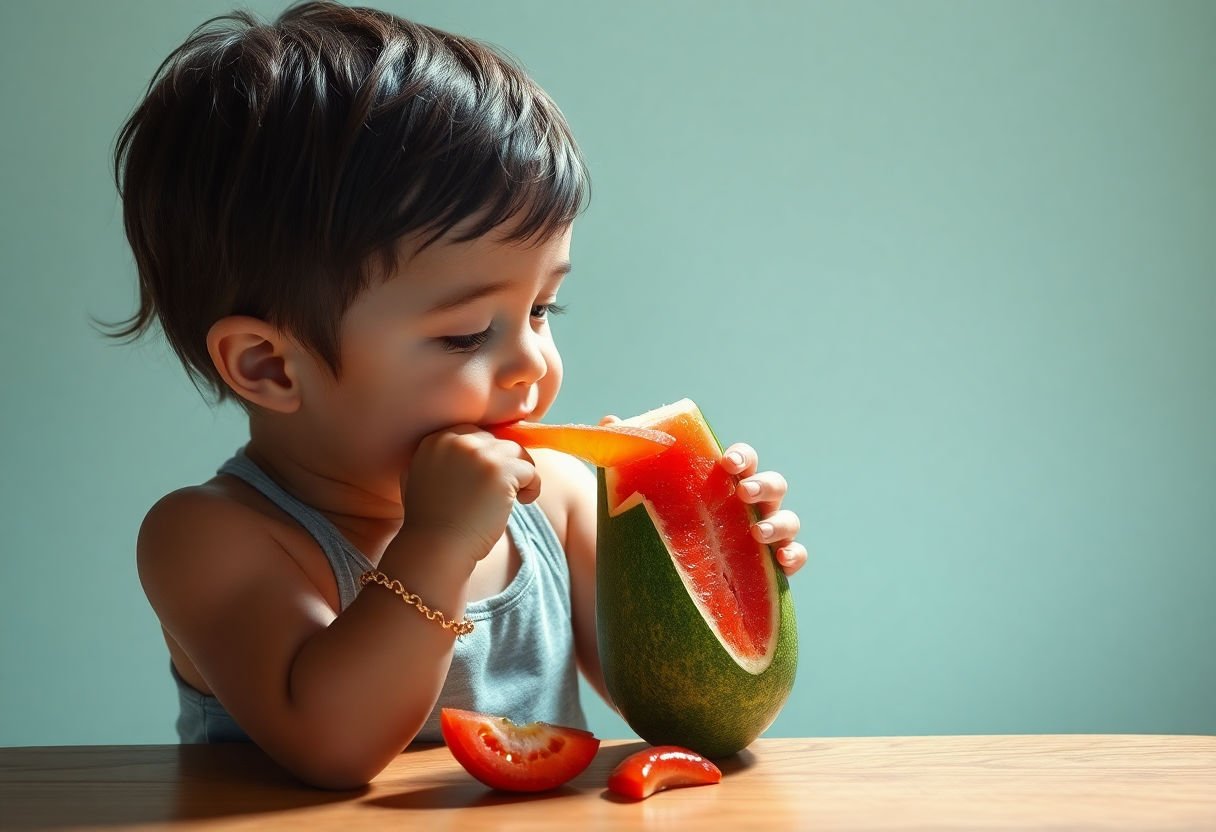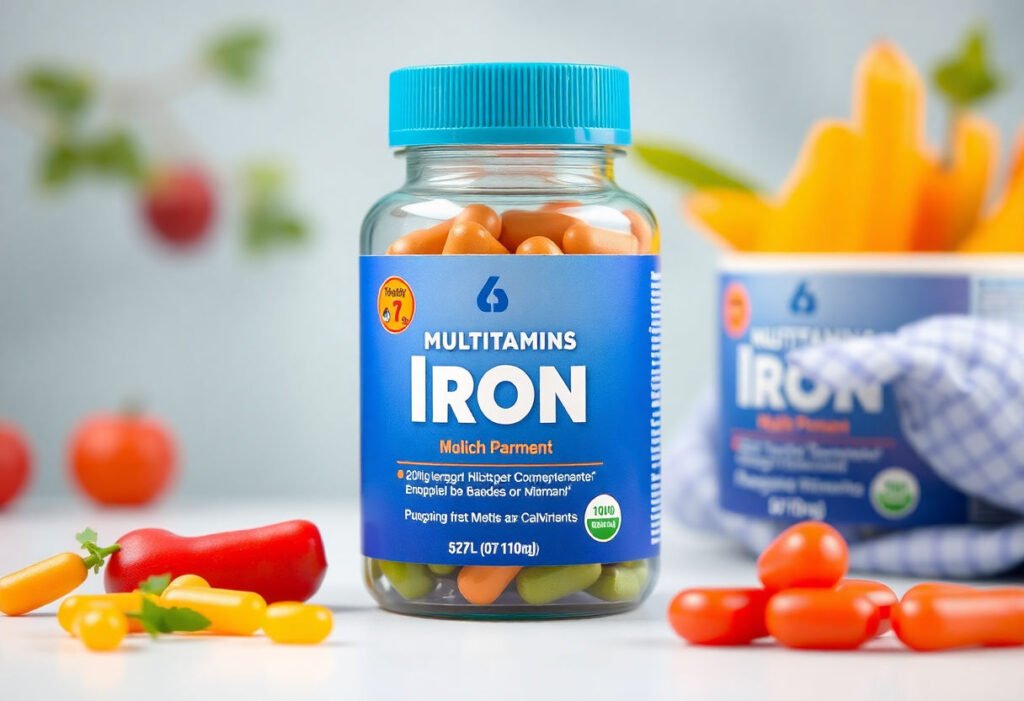Choosing the right multivitamin with iron for your child is vital for supporting their overall health and development. Iron is an essential component in your child’s diet, aiding in cognitive functions and physical growth. This article delves into the significance of this nutrient and provides guidance on identifying the optimal multivitamin to meet your child’s specific needs. You’ll find insights into recognizing essential vitamins and minerals, ensuring product quality and safety, and incorporating supplements seamlessly into daily routines. With expert advice and practical tips, this guide aims to empower parents in making informed decisions for their children’s nutritional well-being.
Key Takeaways
- Selecting the right multivitamin with iron is crucial for addressing children’s unique nutritional needs and supporting their overall health.
- Understanding the role of iron in child development helps in making informed choices that promote physical and cognitive well-being.
- Evaluating multivitamins for quality and safety is essential to ensure they meet established standards and contain safe ingredients.
- Awareness of potential side effects and consulting healthcare professionals can prevent adverse effects and ensure appropriate use.
- Integrating multivitamins into a child’s daily routine requires practical strategies to foster consistency and long-term benefits.
Understanding the Role of Iron in Child Development

Iron plays a fundamental role in child development, as it is a critical component of hemoglobin, the protein in red blood cells responsible for transporting oxygen throughout the body. Adequate oxygen delivery is essential for proper growth and development, particularly in rapidly growing children. Iron also supports cognitive development, influencing the production of neurotransmitters crucial for brain function.
During the formative years, children are in constant need of nutrients to fuel their growth spurt. Insufficient iron intake can lead to iron deficiency anemia, a condition that can hinder physical and mental growth. Symptoms often include fatigue, pale skin, weakness, and developmental delays. Understanding the importance of iron can guide parents in ensuring their child’s diet includes iron-rich foods such as lean meats, beans, spinach, and fortified cereals.
Moreover, children have varied needs at different stages of their development. Babies and toddlers require sufficient iron to prevent delays in motor skills and social interaction, while adolescents need it in greater amounts due to rapid growth and, for girls, menstruation.
Parents should also be mindful of factors that influence iron absorption. Vitamin C-rich foods enhance iron absorption, whereas certain compounds in tea, coffee, and some dairy products may inhibit it. Consequently, a balanced diet with the right combinations can ensure optimal iron uptake. Providing a diet rich in iron or a suitable multivitamin with iron can be an effective way to meet these developmental needs, ensuring better health outcomes for children.
Identifying Nutritional Needs

Identifying the nutritional needs of children is a pivotal step in ensuring their overall health and well-being. Children’s growing bodies require a comprehensive spectrum of essential vitamins and minerals to support their physical and cognitive development. Among these nutrients, iron, vitamin D, calcium, and vitamin A stand out as particularly vital.
Iron is instrumental in promoting healthy blood cell function and oxygen transport. Children who do not receive adequate iron may face issues such as fatigue and impaired cognitive development. Vitamin D is crucial for calcium absorption and bone health. It plays a significant role in preventing rickets, a condition that causes bone weakness and deformities.
Calcium, another critical nutrient, supports robust bone growth during the early years, establishing a sturdy foundation for lifelong skeletal health. Vitamin A contributes to good vision and immune function, helping to protect children from common illnesses.
When assessing nutritional needs, consider factors such as age, dietary restrictions, and any existing health conditions. For instance, children following a vegetarian or vegan diet might need additional supplementation of certain nutrients that are more readily available in animal products, such as vitamin B12 and iron.
A personalized approach to nutrition, supported by regular consultations with healthcare professionals, can ensure that your child’s dietary needs are met optimally. This tailored strategy not only fosters proper growth but also lays the groundwork for lifelong health and wellness, maximizing the benefits derived from multivitamins with iron specifically designed for children.
Choosing the Right Multivitamin with Iron
Selecting the ideal multivitamin with iron for your child requires careful consideration of various factors to ensure their health is supported optimally. Age-specific formulations are crucial as children’s nutritional needs vary with age. Multivitamins designed for specific age groups provide the correct balance of vitamins and minerals necessary for proper development. Additionally, it is essential to consider any unique dietary needs or allergies your child may have. Some children might require allergen-free options or additional nutrients to supplement their diets.
When choosing a multivitamin, pay attention to the form and flavor that suits your child. Multivitamins come in different forms, such as chewables, gummies, and liquids, allowing you to select one that your child is comfortable taking. Flavor can also play a significant role in ensuring compliance, with options ranging from fruity to neutral.
Dosage and concentration are critical; ensure that the multivitamin provides adequate but safe levels of nutrients, particularly iron. Excessive iron intake can lead to adverse effects, so it’s paramount that the product matches the recommended dietary allowances specific to your child’s age and weight.
Look for multivitamins with trusted certifications or labels that indicate third-party testing, such as the United States Pharmacopeia (USP) or NSF International. These certifications help ensure that the product meets high standards of quality and safety.
Consider consulting your child’s pediatrician before starting any supplement regimen. A healthcare provider can provide tailored advice, taking into account your child’s health history and any specific nutritional gaps that need to be addressed. This collaboration ensures that the multivitamin supplement chosen will effectively support your child’s health and development.
Checking for Quality and Safety
For parents choosing a multivitamin with iron for their child’s health, quality and safety should be top priorities. Ensuring that a multivitamin meets high standards of manufacturing can make a significant difference in its efficacy and safety for children.
1. Cease-Look for Quality Certifications:
Opt for multivitamins that have been verified by reputable organizations. Look for certifications such as the United States Pharmacopeia (USP) or NSF International. These seals guarantee that the product has been independently tested to meet stringent quality criteria, including proper ingredient identity, potency, and purity.
2. Examine the Ingredient List:
Scrutinize the ingredient list for both active and inactive ingredients. Ensure that the multivitamin does not contain any harmful additives, artificial colors, or unnecessary fillers. Ingredients should be safe for children, with the formulation catering to their nutritional needs.
3. Evaluate Dosage Accuracy:
The accuracy of dosing is crucial in a child’s multivitamin. Check that the amounts of iron and other nutrients provided align with the Recommended Dietary Allowance (RDA) for your child’s age group. Overconsumption of iron can lead to toxicity, making precise dosages essential.
4. Choose Products from Reputable Brands:
Select products from well-established brands known for their commitment to quality. Established manufacturers often conduct thorough research and testing, ensuring the safety and effectiveness of their supplements.
By focusing on these factors, parents can confidently select a multivitamin with iron that not only supports their child’s nutritional needs but also upholds the highest safety standards.
Potential Side Effects and Precautions

When selecting a multivitamin with iron for your child, it is vital to be informed about potential side effects and necessary precautions. Understanding these helps ensure the safe and effective use of supplements.
Potential Side Effects: While multivitamins with iron are generally safe for children, overconsumption can lead to adverse effects. Iron, in particular, can cause digestive disturbances such as constipation or upset stomach. In rare instances, excessive iron intake can lead to iron toxicity, which requires immediate medical attention. Symptoms of iron toxicity may include abdominal pain, vomiting, rapid heart rate, and in severe cases, organ failure.
Age-Appropriate Dosage: Ensuring the correct dosage based on age and nutritional needs can mitigate risks. It is crucial to adhere to the recommended dietary allowance (RDA) for iron to avoid potential toxicity. Consulting a pediatrician can provide personalized guidance.
Precautions: Always store multivitamins out of reach of young children to prevent accidental ingestion. Educate older children about the importance of following dosage instructions. When introducing a new supplement, monitor for any allergic reactions, which may manifest as rashes, swelling, or difficulty breathing.
Moreover, consider the child’s entire diet and other sources of vitamins, as multivitamins should complement, not replace, a balanced diet. Be cautious with multivitamins containing additional herbs or ingredients that may interact with other medications the child is taking.
In summary, while multivitamins with iron can support your child’s health, awareness of potential side effects and appropriate precautions can maximize their benefits and safeguard their well-being.
Advice from Healthcare Professionals

Consulting with healthcare professionals is essential when considering multivitamins with iron for your child. Pediatricians and nutritionists offer personalized guidance based on a child’s unique health needs, growth patterns, and dietary habits. They highlight the importance of assessing individual nutritional gaps before introducing any supplement.
Pediatricians typically recommend blood tests to determine if a child is deficient in iron, as excessive iron intake can lead to complications. Once an iron deficiency is confirmed, they may suggest a specific dosage adjusted according to age and weight, ensuring safety and effectiveness.
Nutritionists focus on balancing supplement intake with food sources of vital nutrients. They emphasize incorporating a diverse diet alongside multivitamins to help meet daily nutritional requirements naturally. According to many nutritionists, “Supplements should never replace food but rather complement it.”
Healthcare professionals also caution parents to monitor potential side effects like gastrointestinal discomfort or constipation that may arise from increased iron intake. This guidance ensures any adverse reactions are promptly addressed.
Moreover, selecting a multivitamin that has undergone rigorous testing and is backed by a reputable certification, such as the United States Pharmacopeia (USP), is often advised. Professionals stress the importance of choosing products free from excessive sugar, artificial colors, or allergens to prevent potential health issues.
In conclusion, leveraging the expertise of healthcare professionals not only aids in selecting the appropriate multivitamin with iron but also ensures it aligns with a child’s nutritional profile, ultimately supporting their health and development.
Tips for Incorporating Multivitamins into Your Child’s Routine

Incorporating multivitamins into your child’s routine can be both a strategic and seamless process. Here are some practical tips to ensure your child gains maximum benefits from these supplements:
-
Integrate With Meals: Encourage your child to take multivitamins with meals. This not only improves absorption but also reduces potential stomach discomfort. Pairing vitamins with a meal containing some fat can enhance the bioavailability of fat-soluble vitamins.
-
Create a Schedule: Try to administer the multivitamin at the same time each day. Morning routines work well for many families, integrating the supplement intake with breakfast. Consistency helps in forming habits, making the vitamin routine a natural part of daily life.
-
Use Reminders and Visual Aids: Utilize tools like charts or digital reminders to keep track of vitamin intake. Children respond well to visual aids, so a sticker chart rewarding consistent intake can serve as motivation.
-
Educate and Empower: Explain to your child why taking multivitamins is essential for their health. Simple explanations, such as how vitamins help them grow strong and stay energetic, can foster compliance and cooperation.
-
Flavored and Fun Variants: Opt for child-friendly flavored vitamins if possible. Chewable or gummy multivitamins often appeal to children more than traditional pills, making the process enjoyable.
Remember, it’s crucial to emphasize the role of these supplements as complementary to a balanced diet, not as a replacement. Encouraging your child to play an active role in their health routines promotes long-term wellness habits. Always consult a healthcare provider before starting any new supplement regimen to ensure it is tailored to your child’s specific needs.
Conclusion
In conclusion, selecting the right multivitamin with iron is vital to support your child’s health and development. By understanding their nutritional needs and ensuring the choice of high-quality, safe products, parents can effectively enhance their child’s diet. While these supplements can address iron deficiency and support growth, it is crucial to remain vigilant about potential side effects, consulting healthcare professionals for tailored advice. Incorporating these vitamins into a child’s daily routine not only fosters a foundation for robust health but also instills lifelong habits of health-conscious living.
Frequently Asked Questions
What are the benefits of choosing a multivitamin with iron for my child?
A multivitamin with iron supports your child’s growth and development by providing essential nutrients that may be lacking in their diet. Iron, in particular, is crucial for cognitive development and preventing anemia.
How do I know if my child needs a multivitamin with iron?
It is best to consult with a pediatrician to assess whether your child could benefit from a supplement. A healthcare professional can help identify dietary gaps and recommend an appropriate product.
Can too much iron be harmful to my child?
Yes, excessive iron intake can be toxic, leading to symptoms such as stomach pain, vomiting, or, in severe cases, more serious health issues. It’s important to adhere to recommended dosages and seek medical advice when in doubt.
Are there specific ingredients I should look for in a quality multivitamin with iron?
Choose a multivitamin that includes balanced amounts of other essential nutrients like Vitamin D, calcium, and B vitamins. Look for quality seals from reputable organizations to ensure safety and efficacy.
How should I administer multivitamins to ensure my child takes them regularly?
Incorporating multivitamins into a routine, such as during breakfast, can help establish a habit. Be sure the form—whether chewable, liquid, or tablet—suits your child’s preferences to encourage consistent use.


